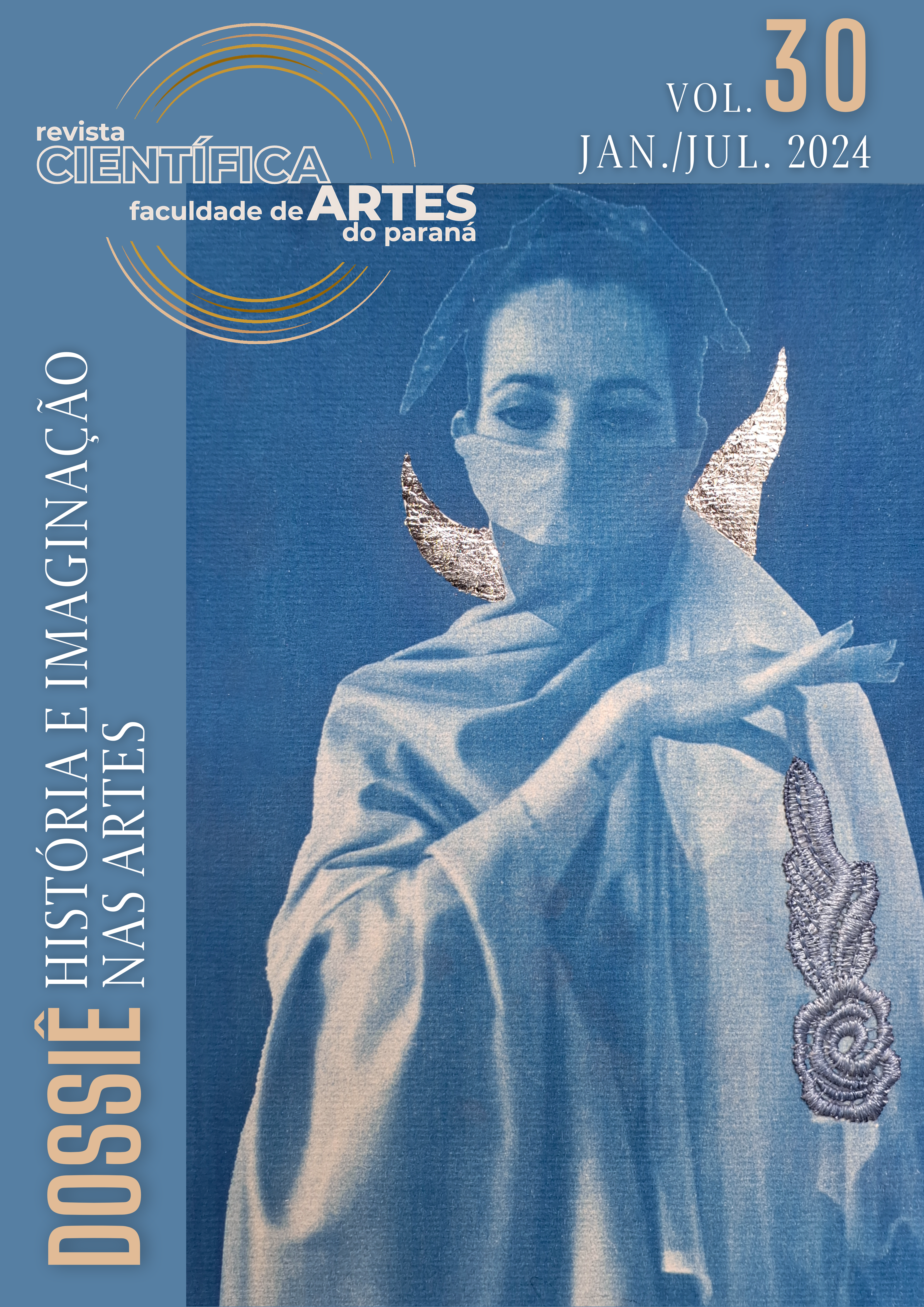Ensaio sobre um processo de criação artística
a (des)ordem da imaginação e do acaso na poética audiovisual
DOI:
https://doi.org/10.33871/19805071.2024.30.1.8764Keywords:
Imagination, Video Arts, Chance, Creation processAbstract
In this reflective essay, our objective is to present a unique process of creation in the video arts, dialoguing with the idea that the creative exercise that gives form to video art – the empirical object of our investigation – is permeated by the transience of the incompleteness of the sensitive and conscious gesture. What (co)moves us in this analytical reasoning is the idea of chance as a possible constitutive path to thinking about and making art through the expansion of imagination, intuition and audiovisual language itself. Our investigative path is based on the type of qualitative and inductive research and, as a methodological approach, we use Process Criticism, since the process of artistic construction of the work of art and the recognition of the methods, materials and notes used by Artists are essential for the procedural study of poetics. We base our essay considerations on a guiding question: in what way does audiovisual poetics embrace the concept of personal landscapes and chance in its formal configuration? The theoretical anchoring of the study refers to Fayga Ostrower (2009; 2013) to account for the concepts of chance, perception and forms of expressiveness in the arts and Cecília de Almeida Salles (2006; 2010; 2013), with regard to Process Criticism.Downloads
References
BETHONICO, Marina Romagnolo; DUBOIS, Philippe. A noção de fingere na produção visual contemporânea: estratégias para mundos possíveis através da imagem. Ars, 2016, V. 14, Nº 27 (55-72). Disponível em: https://www.revistas.usp.br/ars /article/view/117620. Acesso em: 29 out. 2022.
CAMARGO, Marcos. Arte & pensamento estético. Londrina: Syntagma Editores, 2021.
CIRILLO, José. Arquivos de artistas: questões sobre o processo de criação. Vitória, ES: Editora da UFES/PROEX, 2019.
COESSENS, Kathleen. A arte da pesquisa em artes - traçando práxis e reflexão. ARJ – Art Research Journal: Revista de Pesquisa em Artes, [S. l.], v. 1, n. 2, p. 1–20, 2014. Disponível em: https://periodicos.ufrn.br/artresearchjournal/article/view/5423 Acesso em: 12 mai. 2023.
CUNHA, Maria Teresa Santos. Memória, história, biografia: escritas do eu e do outro, escritas da vida. In: PEREIRA, Roberto; MEYER, Sandra; NORA, Sigrid. Histórias em movimento: biografias e registros em dança. Caxias do Sul: Lorigraf, 2008, p. 29-40.
DICIONÁRIO online. Disponível em: https://www.dicio.com.br/memoria/. Acesso em: 10 mar. 2023.
HOOKS, bell. Pertencimento: uma cultura do lugar. São Paulo: Editora Elefante, 2022.
LE GOFF, Jacques. História e memória. Trad. Bernardo Leitão (et al). 6ª ed. Campinas, SP: Editora da Unicamp, 2012.
MELLO, Christine. Extremidades do vídeo. São Paulo: Senac, 2008.
OXFORD LANGUAGES, Dicionário online. Disponível em: https://languages.oup.com/google-dictionary-pt/. Acesso em: 10 mar. 2023.
OSTROWER, Fayga. Criatividade e processos de criação. 24ª. ed. Petrópolis: Vozes, 2009.
OSTROWER, Fayga. Acasos e criação artística. Campinas, SP: Editora da UNICAMP, 2013.
SALLES, Cecília Almeida. Crítica genética - uma (nova) introdução: fundamentos dos estudos genéticos sobre o processo de criação artística. 2 ed. São Paulo: EDUC, 2000.
SALLES, Cecília Almeida. Redes da criação: construção da obra de arte. São Paulo: Horizonte, 2006.
SALLES, Cecília de Almeida. Arquivos de criação: arte e curadoria. Vinhedo: Horizonte, 2010.
SALLES, Cecília de Almeida. Gesto inacabado: processo de criação artística. 6.ed. São Paulo: Intermeios, 2013.
SALLES, Cecília Almeida. Processos de criação em grupo: diálogos. São Paulo: Estação das Letras e Cores, 2017.
Downloads
Published
How to Cite
Issue
Section
License
The authors retain the copyright, when licensing their production in Revista Científica/FAP, which is licensed under a Creative Commons license. When submitting the article, and upon acceptance, the author assigns his copyright for publication in that journal.
Readers can download, print and use the articles published in the journal, as long as there is always an explicit mention of the author (s) and the Revista Científica/FAP, no changes to the original work are allowed. When submitting an article to Revista Científica/FAP and after its being accepted for publication, the authors allow, without remuneration, to pass the following rights to the Journal: the first edition rights and the authorization for the editorial team to transfer, according to their judgment, this article and its metadata to indexing and reference services.


